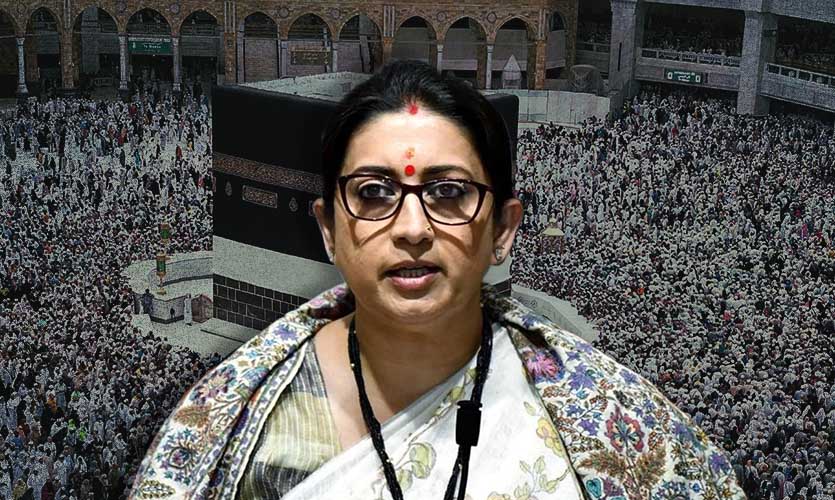The Indian government has decided to discontinue the VIP Haj quota, which was open to those in prominent constitutional positions and the Minority Affairs Ministry.
Union Minority Affairs Minister Smriti Irani, on Wednesday, claimed that the action has been implemented as part of Prime Minister Narendra Modi’s effort to combat ‘VIP culture’.
“VIP culture was put in place with respect to Haj during the UPA rule under which there was a special quota allocated to the Ministry of Minority Affairs, Haj Committee, and all those in top constitutional posts,” said Irani to TV9 Bharatvarsh.
The minister stated that she, along with the President and the Vice-President, has been devoted to the move. Irani criticised the Congress-led UPA administration for implementing the discretionary quota during its tenure in 2012. She went on to say that a new comprehensive Haj policy was being developed to reflect PM Modi’s commitment to meeting the needs of the needy, and that it will be announced soon.
Haj is regarded as pious and a once-in-a-lifetime pilgrimage for all Muslims who are physically and financially able to perform it.
What Was The VIP Haj Quota?
Through seats assigned to India’s President, Vice President, Prime Minister, Union Minority Affairs Minister, and the Haj Committee under the VIP Haj quota, around 500 persons could participate in the Haj. The President’s quota had 100 seats, the Vice President’s quota had 75, the Prime Minister’s quota had 75, and the minority affairs minister quota had 50. The Haj Committee of India (HCOI) had reserved 200 seats.
According to the committee’s package, the Haj expense from India is Rs 3,90,000. So, if 500 persons were allocated the VIP Haj quota under the old method, the Indian government would have to pay Rs 19,500,000 (or Rs 19.5 crores).
The Supreme Court, while hearing a petition filed by the Centre in 2011, which challenged an earlier Bombay High Court judgement directing it to offer a quota of 800 Haj pilgrims to private operators, described the VIP quota for Haj pilgrims as a reprehensible religious practice.
The apex court cut the VIP limit for the Haj pilgrimage from 2,500 to 240 in 2012. The President, the Vice-President, the Prime Minister, and the Minister of External Affairs could each nominate 60, 60, 70, and 50 pilgrims, respectively, under the reduced quota. The remaining 2,260 pilgrims were transferred to the general Haj category.
The general rule followed by Saudi officials was to set aside 1000 pilgrims for every million Muslims in a nation. As a result, India was given a quota of 170,025 pilgrims for Haj in 2013, with 125,025 assigned to the HCOI and 45,000 allocated to Private Tour Operators (PTOs). However, due to extensive civil building activity surrounding Haram Sharif, there was space limitation, forcing Saudi authorities to reduce the number of local pilgrims by 50 percent and international pilgrims by 20 percent. As a result, the Indian Haj contingent has been limited to 136,020 since 2013.
In Saudi Arabia, the Haj pilgrimage will be restored to its pre-pandemic level this year after restrictions curtailed the annual religious ceremony due to fears about COVID, as reported by AP. For 2023, Saudi Arabia has increased the Haj quota for India in a significant move, allowing 1,75,025 Indians to perform Haj, which is the highest number in history.
“India has got a quota of 1 lakh 75 thousand pilgrims for Haj 2023… A record number of over 30,000 Muslims from Uttar Pradesh will undertake the Haj pilgrimage this year,” said Mohsin Raza, Minister of State for Minority Welfare Muslim Waqf and chairperson of the Uttar Pradesh Haj Committee.
As part of a bilateral agreement signed in Jeddah on Monday, both countries attested to this announcement. The agreement was signed at the office of Saudi Arabian Haj by Umrah Deputy Minister Dr Adelfattah bin Suleiam Mash and Indian Consul General Md Shahid Alam. According to the Indian pilgrimage quota, 1.4 lakh pilgrims performed the holy pilgrimage in 2019. As the COVID-19 pandemic hit, the number of pilgrims was reduced to 1.25 lakh, however, Haj was cancelled that year. The Saudi Arabian government welcomed 79,237 Indian pilgrims to the city in 2022. During the Congress-led UPA rule, the highest quota was 1,26,018, in 2010.
Many hopeful Indians have repeatedly been left out of the draw system across the country due to quota limits; however, with the highest-ever quota, more Indian pilgrims can undertake Haj this year, shortening the waiting period and increasing draw possibilities. There was no mention of the cost, but due to the depreciation of the Indian rupee versus the US currency and other cost issues in holy cities they are projected to be on the rise this year.










